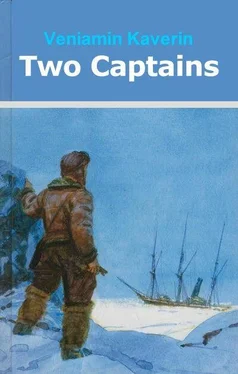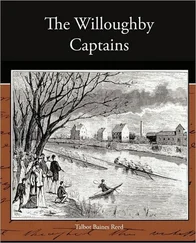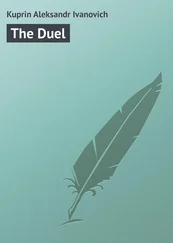The St. Maria became icebound in the Kara Sea and since October 1912 has been drifting steadily north with the Arctic icefields. When we left the schooner she was in latitude 82° 55'. She is standing in the middle of an icefield, or rather that was where she was from the autumn of 1912 until the day I left her. She may be free of the ice this year, but I think this is more likely to happen next year, when she will be round about the spot where the Fram broke free. The men who have remained in her have enough victuals to last until October or November of next year. In any case, I hasten to assure you that we did not leave the ship because she was in a hopeless plight. I had to carry out Captain's orders, of course, but I must admit that they fell in with my own wishes. When I was leaving the ship with the thirteen men, Ivan Lvovich gave me a packet addressed to the Head of the Hydrographical Board-who has since died-and a letter for you. I dare not risk mailing them, because, being the only survivor, I am anxious to preserve all evidence of my honourable conduct. I therefore ask you to send for them or come to Archangel yourself, as I shall be spending at least three months in hospital.
"Awaiting your reply, I remain your obedient servant.
"I. Klimov, Navigating Officer."
The address had been washed away, but had obviously been written in the same bold upright hand on the thick yellowed envelope.
This letter must have become for me something in the nature of a prayer, for I used to repeat it every evening while waiting for my father to come home.
He used to come in late from the wharf. The steamers arrived now every day and took on cargoes, not of flax and grain as they used to do, but of heavy cases containing cartridges and gun parts. Burly, thickset and moustached, he used to come in wearing a cloth cap and tarpaulin trousers. Mother would talk and talk, while he ate in silence, once in a while clearing his throat or wiping his moustache. Then he would take us children-my sister and me-and lie down to sleep. He smelt of hemp, sometimes of apples or grain, and sometimes of rancid machine-oil, and I remember what a depressing effect that smell had on me.
It must have been on one such cheerless evening, as I lay beside my father, that I first became aware of my surroundings. The squalid little room With its low ceiling, its walls pasted over with newspapers, and a big crack under the window through which drew cold air and the tang of the river-such was our home. The dark, beautiful woman with her hair let down, sleeping on the floor on two sacks filled with straw, was my mother. The little feet sticking out from under the patchwork quilt belonged to my sister. The dark skinny boy in the outsize trousers who crept shivering out of bed and stole into the yard was me.
A likely spot had been selected long ago, string had been prepared and even dry twigs piled up at the Gap; all I needed now to go out after the blue crabs was a piece of rotting meat. The bed of our river was all different colours, and so were the crabs in it-black, green, and yellow. These were baited with frogs and lured with a bonfire. But the blue crab, as all of us boys firmly believed, could only be taken with rotting meat. The day before I had had a stroke of luck at last: I had managed to steal a piece of meat from Mother and kept it in the sun all day. It was putrid now-one did not have to take it into one's hand to find that out.
I ran down to the Gap along the river bank: here brushwood had been piled up for a fire. In the distance one could see the towers, Pokrovsky Tower on one bank, Spassky on the other. When the war broke out they were used as army leather goods depots. Pyotr Skovorodnikov used to say that devils once dwelt in Spassky Tower and that he had actually seen them ferrying over to our side, after which they had scuttled their boat and made their home Pokrovsky Tower. He said the devils were fond of smoking and drinking, they had bullet-heads, and many of them were lame, having hurt themselves when they dropped from the sky. In Pokrovsky Tower they raised families and in fine weather went down to the river to steal the tobacco which the fishermen tied to their nets to appease the water-sprites.
So I was not really surprised when, as I was blowing up my little fire, I saw a thin black shape in the gap of the old ramparts.
"What are you doing here, shaver?" the devil said, just like any ordinary human being.
I couldn't have answered him even if I had wanted to. All I could do was just stare and shake.
At that moment the moon sailed out from behind the clouds, and I could make out the figure of the watchman across the river, walking round the leather depot-a burly man with a rifle sticking up behind his back.
"Catching crabs?"
He sprang down lightly and squatted by the fire.
"What's the matter with you, swallowed your tongue, silly?"
No, it wasn't a devil. It was a skinny hatless man with a walking stick which he kept slapping against his leg. I couldn't make out his face, but I noticed he had nothing on under his jacket and was wearing a scarf in place of a shirt.
"Don't want to speak, you rascal, eh?" He prodded me with his stick. "Come on, answer me! Answer! Or I'll-"
Without getting up, he grabbed my leg and pulled me towards him. I gave a sort of croaky sound.
"Ah, you're a deaf mute, I see!"
He let go of me and sat there for quite a while, poking among the embers with his stick.
"Fine town, this," he said disgustedly. "A dog in every blessed yard; brutes of policemen. Damned crab-eaters!"
And he started to swear.
Had I known what was to happen within the hour, I should have tried to remember what he said, although just the same I could not have repeated his words to anybody. He went on swearing for quite a time, and even spat in the fire and gnashed his teeth. Then he fell silent, his head thrown back and knees clasped in his hands. I stole a glance at him and could have felt sorry for him had he not been so unpleasant.
Suddenly the man sprang to his feet. In a few minutes he was on the pontoon bridge, which the soldiers had recently put across the river, and I caught a last glimpse of him on the opposite bank before he disappeared.
My fire had gone out, but even without it I could see clearly that there wasn't a single blue crab among my catch, and a pretty good catch it was. Just ordinary black crabs, none too big either-they went for a kopeck a pair at the local pub.
A cold wind began to draw from somewhere behind me. My trousers billowed out and I began to feel cold. It was time to go home. I was casting my line, baited with meat, for the last time when I saw the watchman on the opposite bank running down the slope. Spassky Tower stood high above the river and the hillside leading down to the river bank was littered with stones. There was no sign of anybody on the hillside, which was lit up brightly by the moon, yet for some reason the watchman unslung this rifle as he ran.
"Halt!"
He did not fire, but just clicked the bolt, and, at that very moment I saw the man he was after on the pontoon bridge. I am choosing my words carefully, because even now I am not quite certain it was the man, who, an hour ago, had been sitting by my fire. But I can still see the scene before my eyes: the quiet banks, the widening moon path on the water running straight from where I was to the barges of the pontoon bridge, and on the bridge the long shadows of two running figures.
The watchman ran heavily and once he even stopped to take breath. But the one who was running ahead seemed to find the going still harder, for he suddenly stopped and crouched down by the handrail. The watchman ran up to him, shouting, then suddenly reeled back, as if he had been struck from below. He hung on the handrail, slowly slipping down, while the murderer was already disappearing behind the rampart.
Читать дальше












